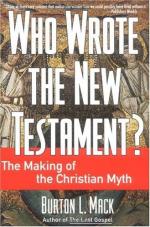
|
| Name: _________________________ | Period: ___________________ |
This test consists of 15 multiple choice questions and 5 short answer questions.
Multiple Choice Questions
1. Whose stories are mimicked in the Miracle Stories?
(a) The Egyptian scriptures.
(b) The Jewish scriptures.
(c) Greek mythology.
(d) Roman myth.
2. Why does Mack think putting aside conventional ideas of the origins of Christianity is difficult for some?
(a) Christians have an investment in the idea that the Old Testament is true.
(b) Christians have an investment in the idea that the Church is infallible.
(c) Christians have an investment in the idea that the New Testament is a collection of myths.
(d) Christians have an investment in the idea that the New Testament is true.
3. What was Paul's view on circumcision for the Gentiles?
(a) Paul let the pillars of Jerusalem answer the question of circumcision.
(b) Paul never answered the question of circumcision.
(c) Paul felt there was no need to circumcise the Gentiles.
(d) Paul felt the Gentiles should be circumcised.
4. How did the Christ cult differ form the Jesus movement?
(a) It focused on Jesus' death and celebrated his spirit.
(b) It focused on Jesus' death and his teachings.
(c) It focused on Jesus' life and his teachings.
(d) It focused on Jesus' life and celebrated his spirit.
5. What notion does Mack believe generated enough excitement to influence the formation of different Jesus groups?
(a) The kingdom of God.
(b) The power of Jesus.
(c) The power of the state.
(d) The concept of Jesus as son of God.
6. What did Paul stress was important, since they were "members of Christ"?
(a) The spirit.
(b) The soul.
(c) The mind.
(d) The body.
7. What did Paul's argument do to Jews and Christians?
(a) Nothing.
(b) Set Jews in opposition to Christians.
(c) Put the two together in brotherhood.
(d) Made the two into one religion.
8. Why does Mack claim that the Jesus cult succeeded?
(a) People liked the idea of a kingdom.
(b) People liked the idea of God.
(c) People liked the idea of a martyr.
(d) People liked the idea of freedom.
9. What does Mack believe the figure of Jesus became with the Pronouncement Stories?
(a) A teacher.
(b) A martyr.
(c) A mystic.
(d) Interpreter of the law.
10. How many layers of the Gospel Q exist?
(a) Five.
(b) Two.
(c) Three.
(d) Twenty.
11. Where did the Jesus movement begin their change to the Christ cult?
(a) Western Syria.
(b) Southern Syria.
(c) Eastern Syria.
(d) Northern Syria.
12. Why does Mack claim the Bible is constantly consulted?
(a) People require it for their faith.
(b) It is important to our politicians.
(c) It is highly important to religious institutions.
(d) It is the only book of God.
13. What does Paul assure the Thessalonians in terms of "those who had died"?
(a) That those who died with God will never die.
(b) That those who died in sin would not be with God after death.
(c) That those who died before Christ could still be saved.
(d) That those who died with God will live with God.
14. What is contained in the Gospel of Thomas?
(a) The sayings of Jesus.
(b) Stories of the disciples.
(c) The myth of the resurrection.
(d) Stories of creation.
15. What is a Christ hymn?
(a) A song specifically geared toward Jesus.
(b) A genre of praise poetry.
(c) A song specifically geared toward God.
(d) A genre of poetry to the angels.
Short Answer Questions
1. What is the name of the form of mythmaking Mack notes these early Jesus people were engaged in?
2. What does Mack claim is the link that gives the Christian Bible logic and force?
3. What does Mack note is mythmaking on a cosmic scale, in terms of the Christ hymn in Philippians 2:6-11?
4. What was Paul's first argument against the idea that Christians should practice Jewish law?
5. Who did Paul argue was the seed of Abraham?
|
This section contains 696 words (approx. 3 pages at 300 words per page) |

|




